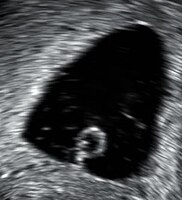
Photo from wikipedia
Abstract The aim of this study was to evaluate clinicians’ views of managing women with first-trimester Recurrent Miscarriage within the UK compared with RCOG guidance. An online survey of 150… Click to show full abstract
Abstract The aim of this study was to evaluate clinicians’ views of managing women with first-trimester Recurrent Miscarriage within the UK compared with RCOG guidance. An online survey of 150 Association of Early Pregnancy Units members was conducted using SurveyMonkey™. Analysis was limited to UK-based respondents (102). Of the three key investigations, 98% performed antiphospholipid antibodies (APA) screening, 93.1% performed karyotyping for subsequent miscarriages and 86.3% performed a pelvic ultrasound routinely. Other routine investigations included inherited thrombophilias (65.7%), thyroid function tests (51.9%), diabetes mellitus screening (35.3%), parental karyotyping (34.3%), androgen profile (25.5%), 3-D ultrasound (17.6%), hysteroscopy (12.7%), hysterosalpingogram (9.8%), Vitamin D (7.8%), peripheral natural killer cells (2.9%) and uterine natural killer cells (2.9%). APA-positive women were offered treatment by 97.1%; however, 23.5% routinely offered treatment for APA-negative women. Other treatments offered routinely included progesterone (27.5%) and metformin (1.9%). Most clinicians managed RM as recommended by RCOG, however we have highlighted considerable deviation from the RCOG guidelines. IMPACT STATEMENT What is already known on this subject? Recurrent miscarriage (RM) can cause significant distress to women and their partners prompting referrals for investigation and management of this condition. Although UK national clinical guidance exists published by RCOG, the adherence to the guidance in clinical practice is not known. What do the results of this study add? This study shows that most clinicians performed investigations recommended by RCOG when managing women with RM. However, we have highlighted considerable variation of practice; many additional investigations were routinely performed and a quarter of clinicians offered treatments outside the RCOG guidance. What are the implications of these findings for clinical practice and/or further research? This paper demonstrates considerable variation of practice across the UK. Clinical practice may continue to vary whilst there are separate guidelines available from different professional organisations worldwide. Collaboration to produce a general consensus could reduce the variation in the care that these women receive.
Journal Title: Journal of Obstetrics and Gynaecology
Year Published: 2020
Link to full text (if available)
Share on Social Media: Sign Up to like & get
recommendations!